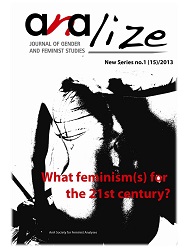Transgressing (New)Feminisms. Towards a Rethinking of (Identity) Politics
Transgressing (New)Feminisms. Towards a Rethinking of (Identity) Politics
Author(s): Diana SocoliucSubject(s): Politics, Anthropology, Gender Studies, Media studies, Gender history, Sociology of Culture
Published by: Societatea de Analize Feministe AnA
Keywords: identity politics; intersectional subject; feminist activism; third-wave;
Summary/Abstract: Feminism encompasses such a wide range of cultural and ideological movements that one may rightfully ask: What is Feminism after all? Post-feminism, Girl Power feminism, Do-Me feminism, Queer feminism, Postcolonial feminism, Cyber feminism, “I'm not a feminist... but...” feminism, Third Wave feminism, postfeminist men, Libertarian feminism, illustrate prolific productions in feminist meanings that are multiple, contradictory, may overlap in their beliefs and other times deny one another. Some of these after-feminism movements have often been criticised of being anti-feminist, too commodified by a mainstream patriarchal media language, while others of being apolitical because of celebrating an indeterminate and intersectional subject. In this article I argue for a feminism that is able to be political while embracing an indeterminate and intersectional subject, by replacing identity politics which is exclusionary and perpetuates hierarchical thinking, with an activist politics that is not subject centred but object (policies and practices) centred. Accepting an epistemological position that challenges categorical thinking and embraces indeterminacy and contradiction, is not incompatible with political activism, it reveals in fact potentialities to change the way we think about politics and to rethink possibilities for changing oppressive mentalities. I explore therefore aspects of feminism's politics of representation and its struggle with defining its own subject on one hand and on the other hand I use my ethnographic field-work research on sexual and gender identity within a LGBT community in Belgium, in order to illustrate the lived-experience of the intersectional subject. By this means I don't want to create an antagonistic relation between representation and the lived-experience but show the complexity of their interdependency in the process of identity and self making. The non-categorical subject should no longer be disquieting, but become a new means of engaging politics. In this regard I draw on third wave political agenda as exemplary for integrating a feminist political agenda with an intersectional and contradictory subject.
Journal: AnALize: Revista de studii feministe
- Issue Year: 2013
- Issue No: 1 (15)
- Page Range: 95-115
- Page Count: 21
- Language: English

